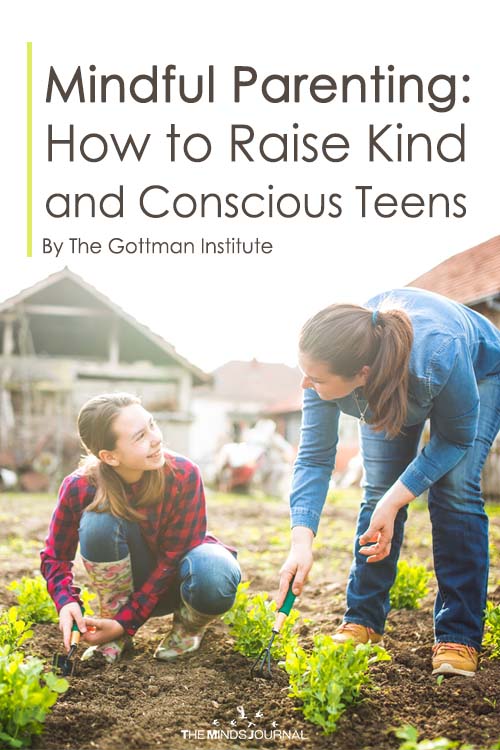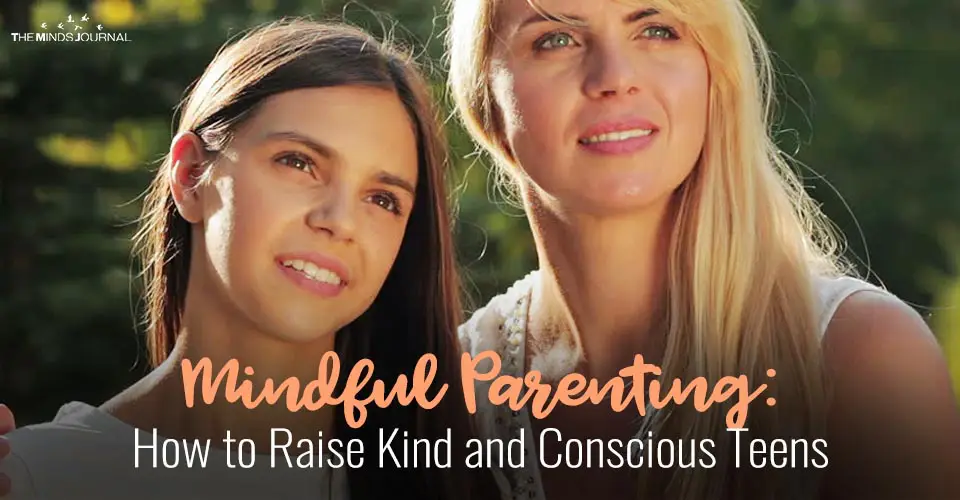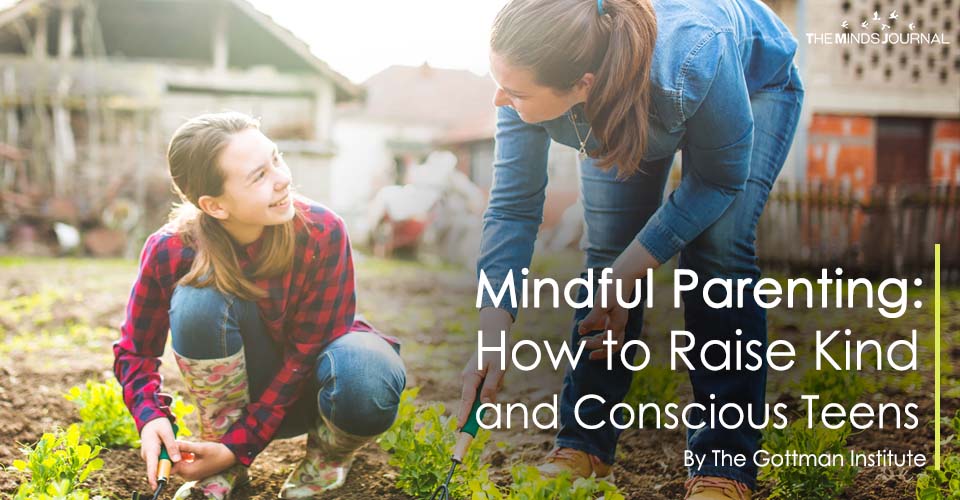Mindful Parenting: How being a mindful parent can help raise kind and conscious kids.
Parents can often find themselves more distracted by their devices than their teens.
This is especially true during the slow moments throughout our day. Slow moments are those moments where you can be with your thoughts and feelings, instead of pulling out your phone to check email, read the news, or scroll through your Facebook feed.
By habitually reaching for our devices during these moments of solitude, we miss out on valuable opportunities to know ourselves better. And you are modeling your teens’ relationship with technology by your own relationship with technology.
So what can we do as parents to be more mindful of what we do?
Small changes towards being more mindful of your relationship with technology can improve the satisfaction and quality of your life as well as in your teens.
Being mindful can be as simple as focusing on your breath, noticing the sounds, smells, or what is going on in your body.
According to a study published in Clinical child and family psychology review, mindful parenting help you to develop the ability and willingness to deal with the constantly growing and changing nature of their child.
Watch out what says about being mindful and conscious parenting
Another study published in the Journal of Emotional and Behavioural Disorders, mindful parenting decreases aggression, noncompliance, and self-injury in children With Autism.
Being mindful allows us to more clearly see the world around us, reduce stress levels, and develop resilience to life’s difficult moments. And by practicing mindfulness we become better Digital Mentors, modeling for our kids how to give space to our inner experience which ultimately leads to healthier relationships with others.
Do you want your child to become successful? here are 11 Of The Most Important Things, Parents of Successful Kids Do
The satisfactions of solitude
First, It’s important to remember that we are all in this together. We live in a culture where a veil of productivity and successful “multitasking” is celebrated, and the draw of social connection through texting and online is hard to ignore.
As Markham Heid explains in his article for TIME, “Combine the sudden beep with the implicit promise of new social info, and you have a near-perfect, ignorable stimulus that will pull your focus away from whatever task your brain is working on.”
But in this attention economy, it is important to take time to slow down and be present with our own thoughts, without reaching for the distraction of technology. MIT researcher Sherry Turkle says that these moments of solitude allow us to know ourselves better, which is an important part of having fulfilling relationships with others.
In Reclaiming Conversation: The Power of Talk in a Digital Age, she says, “If we don’t have experience with solitude – and this is often the case today – we start to equate loneliness and solitude. This reflects the impoverishment of our experience. If we don’t know the satisfactions of solitude, we only know the panic of loneliness.”
In today’s hyperconnected world, Turkle says if we don’t teach our children how to be comfortable being alone, they will learn to be lonely and rely on the distraction of technology. Part of your role as an Emotion Coach and Digital Mentor is to model the importance of slow moments and to create space for difficult or uncomfortable emotions.
Experiencing your emotions
Sometimes uncomfortable emotions will rise to the surface in these moments of solitude. Reaching for our devices when these emotions come up prevents us from experiencing the richness of the full human experience. As comedian Louis CK explained during a recent interview on smartphones, “Because we don’t want that first bit of sad, we push it away. [But] you never feel completely sad or completely happy, you just feel kinda satisfied with your product.”
Do you know how to control emotions? Here are 6 Ways To Control Your Unwanted Emotions In Any Situation
As Brene Brown talks about in her book Daring Greatly, the degree to which we are willing to feel difficult emotions is the degree to which we will experience happiness. If you prevent yourself from feeling down, you can also block yourself from feeling the delight of joy.
The act of noticing and embracing these small moments of emotions rather than giving into the distraction enables us to know ourselves better. Experiencing the range of emotions teaches us that we can self-soothe and that we are truly resilient.
By embracing our own resilience, we can be role models for our teens to do the same. You can start by being mindful.
What is mindfulness?
Simply put, mindfulness is the act of noticing your body, your thoughts and your surroundings. Mindfulness is often explained using the four foundations.
- Mindfulness of your body
- Mindfulness of your feelings
- Mindfulness of your consciousness
- Mindfulness of how your mind operates
Mindfulness is about watching with curiosity about what’s going on inside of you. Below are three exercises to become more mindful as a parent and an individual too.
1. Counting and noting
Find a comfortable spot and take 10 slow, deep breaths. Count each inhale and exhale. When you’ve reached 10, start again. Start by doing this for two minutes.
Mental Noting is an exercise where you give a one-word label to the thought or emotion you are experiencing. This can assist you in recognizing habitual thought patterns. For example, if you are anxious about work, the simple label of “worry” can help bring awareness to your thoughts and release some of the tension in your body. In moments when your kids are stressed or upset, try this strategy with them.
2. Focus on the dishes
Challenge yourself, even in small ways, to concentrate on doing one task at a time. Buddhist teacher Gil Fronsdal has said, “If you are walking to the bus, just walk to the bus. If you are doing the dishes, just do the dishes.” Practice being present in the moment and encourage your teen to do the same.
3. Take a 5-minute break
When you come home at the end of the day, take five minutes to just sit and unwind. I notice there are times when I come home from a long day and immediately get on the computer or pull out my phone to check in with my friends before checking in with myself.
As parents, we are more capable of navigating difficult conversations when we are in touch with ourselves. If we don’t take time to decompress, we may reach for our iPad or tv remote instead of engaging with our teen in a healthy way.
At the core of being a Digital Mentor is acknowledging and validating our teen’s emotions, letting them know their feelings are valuable indicators of what is going on inside them. If your teen comes to you with difficult emotions, practice having a stress-reducing conversation with them. It is important to empathize with your teen and support them to find their own answers.
If you don’t know how to praise your child? Learn How You Need To Talk To Your Daughter About Beauty
The Takeaway
With your new mindfulness practice, invite your teen to join you in new experiences. Try taking a different route to school with your teen, pause and notice the world around you. And ask your teen questions about what they are experiencing as they witness it. Take time to notice the leaves or look up at the clouds together.
Mindfulness leads to noticing the world through a new lens – a lens that leads to meaningful relationships with others, yourself, and most importantly, your teen.












Leave a Reply
You must be logged in to post a comment.